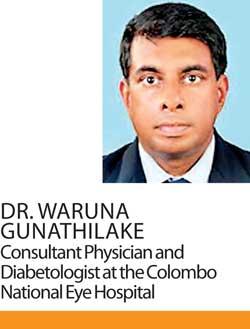26 Jun 2020 - {{hitsCtrl.values.hits}}
 Salt contains sodium and is a mineral that plays an important role not only in renal functions, but is also a vital element for the wellbeing of an individual. Speaking to Health Capsule, Consultant Physician and Diabetologist at the Colombo National Eye Hospital, Dr. Waruna Gunathilake shared his insights on salt deficiency and its impact on the health. “Salt helps maintain the liquid balance in the body through the presence of sodium. Sodium is important for the nerve impulse propagation and the muscle contraction of the body” said Dr. Gunathilake.
Salt contains sodium and is a mineral that plays an important role not only in renal functions, but is also a vital element for the wellbeing of an individual. Speaking to Health Capsule, Consultant Physician and Diabetologist at the Colombo National Eye Hospital, Dr. Waruna Gunathilake shared his insights on salt deficiency and its impact on the health. “Salt helps maintain the liquid balance in the body through the presence of sodium. Sodium is important for the nerve impulse propagation and the muscle contraction of the body” said Dr. Gunathilake.
Risks of salt deficiency
Sodium is very important for kidney function and to maintain the electrolytes in the body. Very high levels of sodium or lack of sodium altogether could be extremely harmful for the patient. “Sodium deficiency can cause unconsciousness, mental confusion and coma. Low sodium levels during old age is taken into serious account as it is often linked to an underlying medical condition.
For an example, even severe pneumonia can result in low sodium levels. Also, certain medication (diuretics) could lead to sodium excretion through the kidney. Such conditions may lead to the patient feeling irritability, confusion and even may lead to a state of coma or unconsciousness in the patient” Dr. Gunathilake explained.
The kidneys contain a mechanism that helps store sodium as well as balance the level of sodium in the body. If the kidneys fail to maintain the balance of sodium in the body, this may again lead to a low sodium level in the patient, which could be dangerous. In old age, it is important to maintain the sodium and potassium balance. In such situation, it is also important to replete the sodium level in the body.
Exercise caution with salt intake
Despite it being an essential ingredient, it is important to be careful about salt intake. High levels of sodium could lead to the health risks of high blood pressure, heart attacks and strokes. People need to adhere to the recommended level of salt intake to avoid the risk of non communicable diseases and to maintain the proper brain function.
“We only need a very small quantity of salt for the functions of the body. The chemical composition of salt contains sodium chloride. 5 grams of salt that is generally bought off the shelves contain 2 grams of sodium and 3 grams of chlorine. Instead of over consuming salt, it is better to consume the recommended level of salt, which is 5 grams for an adult per day. Salt should not be added for young children under one year. Try to avoid high salt diets as well as very low salt diets, rather adhere to a balanced diet” he added.
Salt deficiency and over consumption
Our main source of sodium is derived through salt in food. Consuming high levels of salt could lead to high blood pressure and in order to counteract that, people could consume food rich in Potassium.
Fruits and vegetables rich in Potassium could be consumed along with a mindful diet with strict salt restriction as this would help prevent high blood pressure. Short eats, sauce, baked food products, sausages, milk, meat, prawns and oysters contains salt as a natural form and hence, should be consumed in limited quantity.
Briefing in the treatment procedure, Dr. Gunathilke said that patients with low sodium levels need to be admitted to the hospital immediately. “Under strict medical supervision, the careful management of the sodium balance should be ensured in such patients, as the rapid correction of sodium could also be too intense for the patients” he concluded.
21 Dec 2024 5 minute ago
21 Dec 2024 6 hours ago
21 Dec 2024 7 hours ago
21 Dec 2024 21 Dec 2024
21 Dec 2024 21 Dec 2024